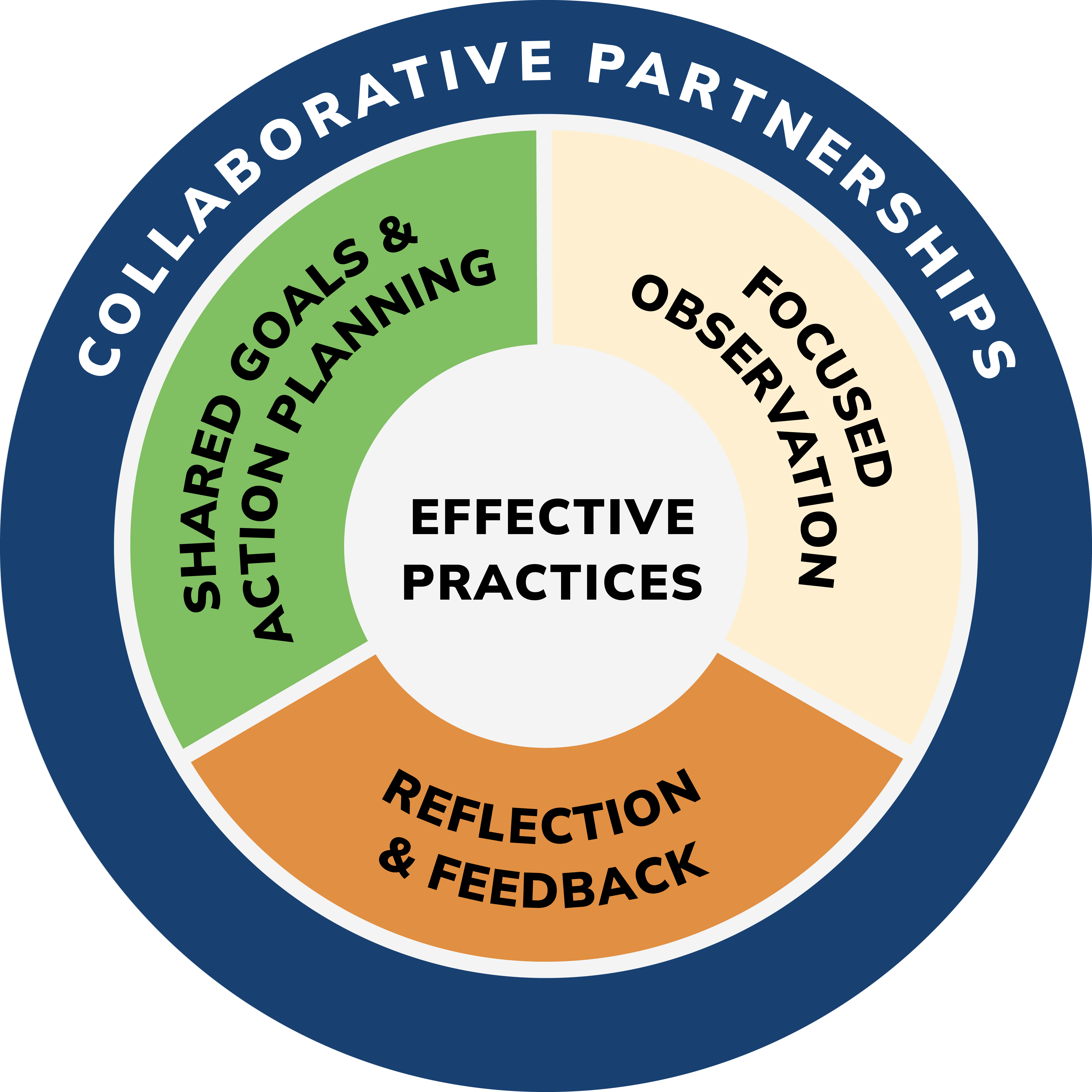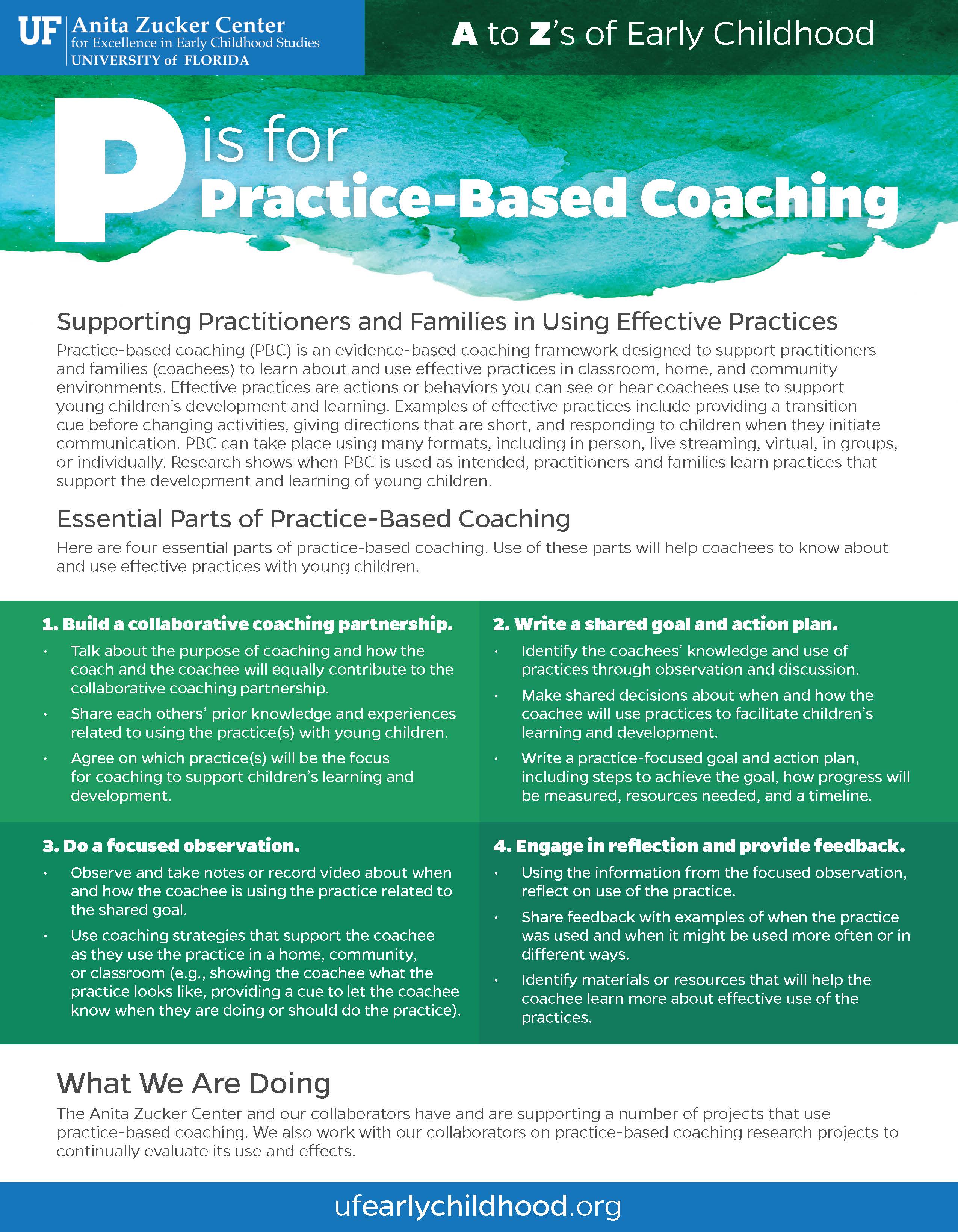A to Z’s of Early Childhood
The Science of Child Development and Learning
P is for Practice-Based Coaching
Supporting Practitioners and Families in Using Effective Practices
Practice-based coaching (PBC) is an evidence-based coaching framework designed to support practitioners and families (coachees) to learn about and use effective practices1 in classroom, home, and community environments. Effective practices are actions or behaviors you can see or hear coachees use to support young children’s development and learning. Examples of effective practices include providing a transition cue before changing activities, giving directions that are short, and responding to children when they initiate communication. PBC can take place using many formats, including in person, live streaming, virtual, in groups, or individually. Research shows when PBC is used as intended, practitioners and families learn practices that support the development and learning of young children2,3.

Essential Parts of Practice-Based Coaching
Here are four essential parts of practice-based coaching. Use of these parts will help coachees to know about and use effective practices with young children.

Snyder, Hemmeter, & Fox (2015)
Part #1 - Build a collaborative coaching partnership.
- Talk about the purpose of coaching and how the coach and the coachee will equally contribute to the collaborative coaching partnership.
- Share each others’ prior knowledge and experiences related to using the practice(s) with young children.
- Agree on which practice(s) will be the focus for coaching to support children’s learning and development.
Part #2 - Write a shared goal and action plan.
- Identify the coachees’ knowledge and use of practices through observation and discussion.
- Make shared decisions about when and how the coachee will use practices to facilitate children’s learning and development.
- Write a practice-focused goal and action plan, including steps to achieve the goal, how progress will be measured, resources needed, and a timeline.
Part #3 - Do a focused observation.
- Observe and take notes or record video about when and how the coachee is using the practice related to the shared goal.
- Use coaching strategies that support the coachee as they use the practice in a home, community, or classroom (e.g., showing the coachee what the practice looks like, providing a cue to let the coachee know when they are doing or should do the practice).
Part #4 - Engage in reflection and provide feedback.
- Observe and take notes or record video about when and how the coachee is using the practice related to the shared goal.
- Use coaching strategies that support the coachee as they use the practice in a home, community, or classroom (e.g., showing the coachee what the practice looks like, providing a cue to let the coachee know when they are doing or should do the practice).
What We Are Doing
The Anita Zucker Center and our collaborators have and are supporting a number of projects that use practice-based coaching. We also work with our collaborators on practice-based coaching research projects to continually evaluate its use and effects.
Originally developed at the Anita Zucker Center as part of a federally funded research project called Embedded Instruction for Early Learning in 2007, PBC has been a core feature of the Anita Zucker Center’s professional development focus. PBC has been used to support providers working with children birth through grade 2 and their families to implement practices focused on everyday learning opportunities, embedded instruction, positive behavior supports, language and early literacy, and motor practices. A derivative of PBC was adopted by Head Start as an evidence-based approach to enhancing interactions and instruction and was implemented nation-wide starting in 2011 under the National Center on Quality Teaching and Learning, now the National Center on Early Childhood Development, Teaching, and Learning. In addition, PBC has been used to enhance practice quality in early care and education settings for children birth to age five in Alachua county through collaborations with the CHILD Center and the Early Learning Coalition of Alachua County with support from the transformative professional development grant. The links and publications below provide more information about the application of PBC within each of these activities.
Practice-Based Coaching Overview
Learn more about the parts and essential strategies of the practice-based coaching framework.
- Professional development that works: How coaching can transform early learning experiences
Read more about how personnel at the Anita Zucker Center have developed, implemented, and evaluated the practice-based coaching framework. - Head Start National Center for Quality Teaching and Learning
Read more about the components of practice-based coaching from our collaborators and personnel at the Anita Zucker Center.
Practice-Based Coaching Partnerships
- ParaImpact: Professional Development with Teacher-as-Coach for Paraeducators of Elementary Students with Moderate to Severe Developmental Disabilities
This project focuses on providing professional development, including practice-based coaching, for paraprofessionals to help them implement systematic instructional procedures to support children with moderate to severe developmental disabilities. - Step Up AT: Improving Literacy Through Technology
This project focuses on providing professional development, including practice-based coaching and resources, to increase preschool special education teachers and parents’ knowledge of evidence-based assistive technology (AT) practices to increase early literacy outcomes for preschool children with disabilities. - Training Teachers to Teach Vocabulary (T3V): A Professional Development Intervention for Toddler and Preschool Teachers of Children at Risk for Communication Difficulties
This project focuses on providing professional development to Early Head Start and Head Start practitioners to help them support the vocabulary skills of young children at risk for communication delays. - Transforming Professional Development (TPD)
This project focuses on working in collaboration with the CHILD Center and the Early Learning Coalition of Alachua County to provide professional development, including practice-based coaching, to child care providers to help them support the growth and development of young children. - Building a Statewide System for Inclusion
This project focuses on working in collaboration with the South Carolina Inclusion Collaborative to provide professional development, including practice-based coaching to child care providers, to help them support the growth and development of young children with or at risk for developmental delays.
Other Resources
Practice-based Coaching
- Practice-based Coaching: Overview of ComponentsThis Head Start web page explains the basic components of PBC and includes videos and other resources.
- Practice-based Coaching: Coaching Corner Webinar SeriesThis webinar series from Head Start offers videos on topics such as collaborative partnerships, goal setting and action planning, and implementing essential and enhancement coaching strategies.
- Learning Lab: Coaching for Practice Change
This webinar from the Early Childhood Technical Assistance Center (ECTA) provides information, resources, and discussions with PBC experts and colleagues.
Effective Practices
- Performance Checklists
Download these useful PDF checklists from ECTA to increase understanding and use of the Division for Early Childhood Recommended Practices. - Head Start Early Learning Outcomes Effective Practice Guides
These guides provide information about domain-specific teaching practices that support children’s development. - Pyramid Model Practices Implementation Checklist
A derivative of the Teaching Pyramid Observation Tool (TPOT), these practice checklists specify practices used to promote social emotional development and reduce challenging behavior.
Publications by Center Members and Collaborators
Practice-based Coaching
- Shannon, D., Bishop, C., Snyder, P., & Jaramillo, J. (2018). Developing a collaborative partnership to enhance teaming: Using a practice-based coaching framework. In P. J. Winton, C. Guillen, & A. G. Schnitz (Eds.), Teaming and collaboration: Building and sustaining partnerships: DEC Recommended Practices Monograph Series (No. 6, pp. 39-52). Division for Early Childhood.
- Shannon, D. K., Snyder, P. A., Hemmeter, M. L., & McLean, M. (2021). Exploring coach-teacher interactions within a practice-based coaching partnership. Topics in Early Childhood Special Education, 40(4), 229-240. https://doi.org/10.1177/0271121420910799
- Shannon, D., Snyder, P., & McLaughlin, T. (2015). Preschool teachers’ insights about web-based self-coaching versus on-site expert coaching. Professional Development in Education, 41(2), 290-309. https://doi.org/10.1080/19415257.2014.986819
- Snyder, P., Hemmeter, M. L., & Fox, L. (Eds.). (2020). Essentials of practice-based coaching. Brookes.
- Snyder, P. A., Hemmeter, M. L., & Fox, L. (2015). Supporting implementation of evidence-based practices through practice-based coaching. Topics in Early Childhood Special Education, 35(3), 133-143. https://doi.org/10.1177/0271121415594925
Embedded Instruction
- Bishop, C. D., Snyder, P. A., & Crow, R. (2015). Impact of video self-monitoring with graduated training on implementation of embedded instruction learning trials. Topics in Early Childhood Special Education, 35(3), 170-182. https://doi.org/10.1177/0271121415594797
- Snyder, P., Hemmeter, M. L., McLean, M., Sandall, S., McLaughlin, T., & Algina, J. (2018). Effects of professional development on preschool teachers’ use of embedded instruction practices. Exceptional Children, 84(2), 213-232. https://doi.org/10.1177/0014402917735512
Positive Behavior Supports
- Conroy, M. A., Sutherland, K. S., Algina, J., Ladwig, C., Werch, B., Martinez, J., Jessee, G., & Gyure, M. (2019). Outcomes of the BEST in CLASS intervention on teachers’ use of effective practices, self-efficacy, and classroom quality. School Psychology Review, 48(1), 31-45. https://doi.org/10.17105/SPR-2018-0003.V48-1
- Conroy, M. A., Sutherland, K. S., Algina, J., Werch, B., & Ladwig, C. (2018). Prevention and treatment of problem behaviors in young children: Clinical implications from a randomized controlled trial of BEST in CLASS. AERA Open, 4(1). https://doi.org/10.1177/2332858417750376
- Conroy, M. A., Sutherland, K. S., Algina, J. J., Wilson, R. E., Martinez, J. R., & Whalon, K. J. (2015). Measuring teacher implementation of the BEST in CLASS intervention program and corollary child outcomes. Journal of Emotional and Behavioral Disorders, 23(3), 144-155. https://doi.org/10.1177/1063426614532949
- Conroy, M. A., Sutherland, K. S., Vo, A. K., Carr, S., & Ogston, P. L. (2014). Early childhood teachers’ use of effective instructional practices and the collateral effects on young children’s behavior. Journal of Positive Behavior Interventions, 16(2), 81-92. https://doi.org/10.1177/1098300713478666
- Fox, L., Hemmeter, M. L., Snyder, P., Binder, D. P., & Clarke, S. (2011). Coaching early childhood special educators to implement a comprehensive model for promoting young children’s social competence. Topics in Early Childhood Special Education, 31(3), 178-192. https://doi.org/10.1177/0271121411404440
- Hemmeter, M. L., Snyder, P. A., Fox, L., & Algina, J. (2016). Evaluating the implementation of the Pyramid Model for Promoting Social-Emotional Competence in early childhood classrooms. Topics in Early Childhood Special Education, 36(3), 133-146. https://doi.org/10.1177/0271121416653386
References
- Snyder, P. A., Hemmeter, M. L., & Fox, L. (2015). Supporting implementation of evidence-based practices through practice-based coaching. Topics in Early Childhood Special Education, 35(3), 133-143. https://doi.org/10.1177/0271121415594925
- Snyder, P., Hemmeter, M. L., McLean, M., Sandall, S., McLaughlin, T., & Algina, J. (2018). Effects of professional development on preschool teachers’ use of embedded instruction practices. Exceptional Children, 84(2), 213-232. https://doi.org/10.1177/0014402917735512
- Conroy, M. A., Sutherland, K. S., Algina, J. J., Wilson, R. E., Martinez, J. R., & Whalon, K. J. (2015). Measuring teacher implementation of the BEST in CLASS intervention program and corollary child outcomes. Journal of Emotional and Behavioral Disorders, 23(3), 144-155. https://doi.org/10.1177/1063426614532949
Receive Additional Support
The complete 3R’s of Early Learning downloadable video recordings (including the A to Z’s of Early Childhood) for use in the field of childhood development to facilitate learning are available for purchase.
If you would like to purchase these resources or speak with a member of our team for help in providing professional development, please complete this contact form.

